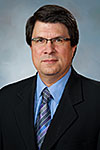UHV adds petroleum technology concentration to applied sciences program
Students and oil industry workers looking to further their education and learn advanced practices can benefit from the University of Houston-Victoria’s new petroleum technology concentration.
The concentration is available this spring for students pursuing a Bachelor of Applied Arts & Sciences.
“The oil industry has experienced probably the greatest technology upgrade since its birth,” said Yun Wan, a UHV associate professor of computer science and director of the BAAS program. “New oil-drilling technologies like fracking and horizontal drilling have revitalized oil production in Texas. A bachelor degree is important for students to remain competitive in the oil industry job market.”
A survey conducted by the UHV School of Arts & Sciences identified petroleum technology as an area of need for prospective students.
“Petroleum technology requires knowledge of physics, geology, chemistry and mathematics as a foundation, so it is a natural extension of our current science, technology, engineering and mathematics offerings,” Wan said. “It comprises the disciplines of petroleum geology, geophysics, petrophysics, geochemistry, geomechanics and reservoir engineering. Adding this concentration is in line with our mission to develop UHV into a destination university with more comprehensive program offerings.”
Students with an associate degree in applied arts and sciences, or 30 or more vocational semester hours in petroleum engineering, geology, mechanical engineering, chemical engineering or other related oil and gas majors, are eligible to apply to the UHV BAAS program.
Once enrolled, students can choose five specialization classes to earn 15 semester credit hours. Class choices include “Thermodynamics,” “Fluid Mechanics,” “Petroleum Reservoir Engineering,” “Well Logging,” “Drilling Engineering” and “Petroleum Production Engineering.”
Aftab Alam, CEO of Prime Geoscience Corp., a Sugar Land research, development and products company, and Hi-Res Geophysical, a service company, will teach the classes. He previously served as the research and development director at LMKR-GeoGraphix in Houston and vice president of Landmark Graphics Corp. in Houston.
Alam earned a master’s degree in geophysics from Imperial College University of Science & Technology in London, a master’s degree in physics and mathematics from Government College University in Lahore, Pakistan, and a doctorate in electrical engineering from SMU.
Wan said that Alam suggested several ideas about the design of the new concentration.
“We are excited about the opportunity this new concentration will bring to our students, especially with an industry veteran teaching the courses,” Wan said. “I think Dr. Alam’s profile and credentials will attract a lot of potential students. He will provide field experience to our first batch of enrolled students in the spring semester.”
The recent economic downturn in the oil industry has led to renewed interest in higher education, said Jeffrey Di Leo, dean of the UHV School of Arts & Sciences.
“History has shown a downturn in an industry usually is the best time for students to prepare for the future job market or for current employees to go back to school to earn an advanced degree,” he said. “Being in the heart of oil and gas country, UHV is well positioned to offer a program that will give students the knowledge, tools and practice necessary to be competitive in the job market.”
Students need a total of 120 credit hours to graduate with a BAAS. In addition to core education requirements, vocational or technical credits and petroleum technology courses, the concentration requires completion of three courses: “Advanced Professional Speaking,” “Ethics” and “Intercultural Communications.” The rest of the courses can be electives in math, computer science, mechanics, petroleum and gaming.
Petroleum technology will be the 14th available BAAS concentration. The list of other options includes biotechnology, biology, communication, computer information systems, digital gaming and simulation, general business, leadership and enterprise studies, legal assistance and administration, networking and security, marketing, psychology, and Web and media. There also is a general studies option that allows students to pick which upper-division courses they want to take in the UHV schools of Arts & Sciences and Business Administration.
For more information about the BAAS program, call 361-570-4201 or visit www.uhv.edu/arts-and-sciences/. UHV spring classes start Jan. 19, but the university will be closed Thursday through Jan. 3.
The University of Houston-Victoria, located in the heart of the Coastal Bend region since 1973 in Victoria, Texas, offers courses leading to more than 80 academic programs in the schools of Arts & Sciences; Business Administration; and Education, Health Professions & Human Development. UHV provides face-to-face classes at its Victoria campus, as well as an instructional site in Katy, Texas, and online classes that students can take from anywhere. UHV supports the American Association of State Colleges and Universities Opportunities for All initiative to increase awareness about state colleges and universities and the important role they have in providing a high-quality and accessible education to an increasingly diverse student population, as well as contributing to regional and state economic development.
Jeremy Shapiro
361-570-4350






